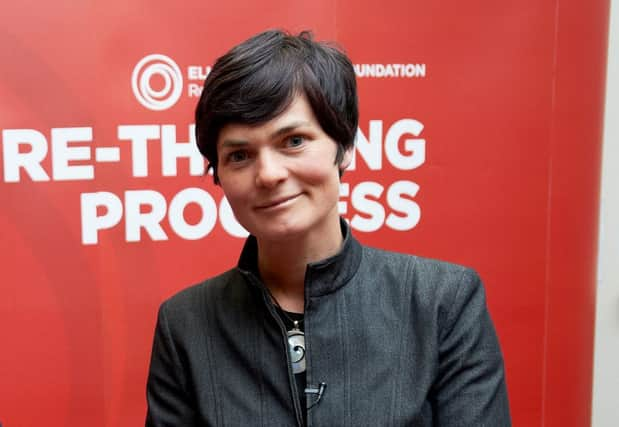Go full circle, Dame Ellen urges business


Dame Ellen MacArthur believes the lessons she learned during her record-breaking sailing career could help to preserve our natural resources.
She visited Bradford University to mobilise support for her latest venture – the Ellen MacArthur Foundation – which urges the business world to embrace the circular economy; a system that reduces waste and protects the environment.
Advertisement
Hide AdAdvertisement
Hide AdIn the circular economy, goods are designed so they can be repaired, and biological materials return to the biosphere uncontaminated.


Dame Ellen told the audience of business leaders and academics at Bradford University’s Norcroft Centre that her experiences at sea had shaped her understanding of how we rely on finite resources, which must be managed intelligently.
She hit the headlines in 2001 when, at the age of 24, she raced single-handedly non-stop around the world in the Vendée Globe.
In 2004, she sailed out of Falmouth on board the 75ft trimaran B&Q on an even more ambitious mission. She returned 71 days later, having sailed more than 26,000 miles, to become the fastest person to circumnavigate the globe single-handed.
Advertisement
Hide AdAdvertisement
Hide AdShe became a Dame in 2005 and has received the Legion d’Honneur from French President, Nicolas Sarkozy.
In 2010 she launched the Ellen MacArthur Foundation with the goal of “accelerating the transition to a regenerative, circular economy”. The foundation works in the areas of business, education and communication.
Dame Ellen decided to retire from professional sailing, and she has spent the last five years working with governments, scientists and industries to analyse our reliance on finite resources in the form of materials, energy and water.
She believes economic activity should be re-generative to ensure nothing is wasted. She is working with organisations including the World Economic Forum to make her dreams become closer to reality.
Advertisement
Hide AdAdvertisement
Hide AdDame Ellen told the Bradford University audience: “When you go to sea and you embark on a journey... you manage everything you have.
“You manage the material flows and you make sure that you don’t run out of anything, and you understand what ‘finite’ means. That’s one element.
“The second element is the system in which you live. You’re entirely connected to that, and your life depends on that, from the water temperature to the depth of the ocean, to the clouds above you, to the satellite pictures, to what you see with your own eyes. Everything is connected.
“They are all connected and you are part of a much bigger system and if the water temperature changes by two degrees, you absolutely know the winds are going to change too.
Advertisement
Hide AdAdvertisement
Hide Ad“It takes time to understand the relationship between these different things. Nobody teaches you that. You learn that from experience. But, actually, our economy is no different. It’s a system. Everything is connected.”
Dame Ellen was speaking at an event with the title ‘Changing paradigms – Business and the circular economy’.
Bradford University School of Management recently launched a circular economy MBA, which was developed in partnership with the Ellen MacArthur Foundation and leading businesses including B&Q, BT, Cisco, Renault and National Grid.
Dame Ellen said: “The circular economy is very much a lens through which you view the entire economy. It’s not a few things we pick from a list. It’s ultimately about how you see the entire economy.”
Advertisement
Hide AdAdvertisement
Hide AdDuring 2013, the World Economic Forum in partnership with the Ellen MacArthur Foundation – with the support of McKinsey & Company – engaged in conversations with business leaders.
Towards the Circular Economy: Accelerating the scale-up across global supply chains, which was launched in the Forum’s 2014 Annual Meeting in Davos, describes the results of this research and lays out a plan of action.
The report highlights the need for more circular flows of major global raw materials, such as polymers, steel and glass. Dame Ellen said the ideas behind the foundation were gaining momentum.